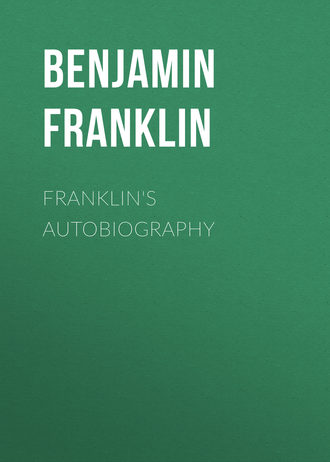 полная версия
полная версияFranklin's Autobiography
I began now gradually to pay off the debt I was under for the printing house. In order to secure my credit and character as a tradesman, I took care not only to be in reality industrious and frugal, but to avoid all appearances to the contrary. I dressed plainly; I was seen at no places of idle diversion; I never went out a-fishing or shooting; a book, indeed, sometimes debauched me from my work, but that was seldom, snug, 103 and gave no scandal; and, to show that I was not above my business, I sometimes brought home the paper I purchased at the stores through the streets on a wheelbarrow. Thus, being esteemed an industrious, thriving young man, and paying duly for what I bought, the merchants who imported stationery solicited my custom; others proposed supplying me with books, and I went on swimmingly. In the mean time, Keimer's credit and business declining daily, he was at last forced to sell his printing house to satisfy his creditors. He went to Barbadoes, and there lived some years in very poor circumstances.
His apprentice, David Harry, whom I had instructed while I worked with him, set up in his place at Philadelphia, having bought his materials. I was at first apprehensive of a powerful rival in Harry, as his friends were very able and had a good deal of interest. I therefore proposed a partnership to him, which he, fortunately for me, rejected with scorn. He was very proud, dressed like a gentleman, lived expensively, took much diversion and pleasure abroad, ran in debt, and neglected his business; upon which, all business left him; and, finding nothing to do, he followed Keimer to Barbadoes, taking the printing house with him. There this apprentice employed his former master as a journeyman; they quarreled often; Harry went continually behindhand, and at length was forced to sell his types and return to his country work in Pennsylvania. The person that bought them employed Keimer to use them, but in a few years he died.
There remained now no competitor with me at Philadelphia but the old one, Bradford, who was rich and easy, did a little printing now and then by straggling hands, but was not very anxious about the business. However, as he kept the post office, it was imagined he had better opportunities of obtaining news. His paper was thought a better distributer of advertisements than mine, and therefore had many more, which was a profitable thing to him, and a disadvantage to me; for, though I did indeed receive and send papers by post, yet the public opinion was otherwise, for what I did send was by bribing the riders, 104 who took them privately, Bradford being unkind enough to forbid it, which occasioned some resentment on my part; and I thought so meanly of him for it that, when I afterward came into his situation, I took care never to imitate it.
I had hitherto continued to board with Godfrey, who lived in part of my house with his wife and children, and had one side of the shop for his glazier's business, though he worked little, being always absorbed in his mathematics. Mrs. Godfrey projected a match for me with a relation's daughter, and took opportunities of bringing us often together, till a serious courtship on my part ensued, the girl being in herself very deserving. The old folks encouraged me by continual invitations to supper, and by leaving us together, till at length it was time to explain. Mrs. Godfrey managed our little treaty. I let her know that I expected as much money [n] with their daughter as would pay off my remaining debt for the printing house, which I believe was then above a hundred pounds. She brought me word they had no such sum to spare. I said they might mortgage their house in the loan office. The answer to this, after some days, was that they did not approve the match; that, on inquiry of Bradford, they had been informed the printing business was not a profitable one; the types would soon be worn out and more wanted; that S. Keimer and D. Harry had failed one after the other, and I should probably soon follow them; and therefore I was forbidden the house, and the daughter shut up.
Whether this was a real change of sentiment, or only artifice, on a supposition of our being too far engaged in affection to retract, and therefore that we should steal a marriage, which would leave them at liberty to give or withhold what they pleased, I know not; but I suspected the latter, resented it, and went no more. Mrs. Godfrey brought me afterward some more favorable accounts of their disposition, and would have drawn me on again; but I declared absolutely my resolution to have nothing more to do with that family. This was resented by the Godfreys; we differed, and they removed, leaving me the whole house, and I resolved to take no more inmates.
But this affair having turned my thoughts to marriage, I looked round me and made overtures of acquaintance in other places; but soon found that, the business of a printer being generally thought a poor one, I was not to expect money with a wife, unless with such a one as I should not otherwise think agreeable. In the mean time a friendly correspondence as neighbors and old acquaintances had continued between me and Mr. Read's family, who all had a regard for me from the time of my first lodging in their house. I was often invited there and consulted in their affairs, wherein I sometimes was of service. I pitied poor Miss Read's unfortunate situation, who was generally dejected, seldom cheerful, and avoided company. I considered my giddiness and inconstancy when in London as in a great degree the cause of her unhappiness, though the mother was good enough to think the fault more her own than mine, as she had prevented our marrying before I went thither, and persuaded the other match in my absence. Our mutual affection was revived, but there were now great objections to our union. The match 105 was indeed looked upon as invalid, a preceding wife being said to be living in England; but this could not easily be proved because of the distance; and though there was a report of his death, it was not certain. Then, though it should be true, he had left many debts, which his successor might be called upon to pay. We ventured, however, over all these difficulties, and I took her to wife Sept. 1, 1730. None of the inconveniences happened that we had apprehended; she proved a good and faithful helpmate, assisted me much by attending shop, we throve together, and have ever mutually endeavored to make each other happy. Thus I corrected that great erratum as well as I could. 106
About this time, our club meeting not at a tavern but in a little room of Mr. Grace's set apart for that purpose, a proposition was made by me that, since our books were often referred to in our disquisitions upon the queries, it might be convenient to us to have them all together where we met, that upon occasion they might be consulted; and by thus clubbing our books to a common library, we should, while we liked to keep them together, have each of us the advantage of using the books of all the other members, which would be nearly as beneficial as if each owned the whole. It was liked and agreed to, and we filled one end of the room with such books as we could best spare. The number was not so great as we expected; and though they had been of great use, yet, some inconveniences occurring for want of due care of them, the collection, after about a year, was separated, and each took his books home again.
And now I set on foot my first project of a public nature, – that for a subscription library. [n] I drew up the proposals, got them put into form by our great scrivener, Brockden, and, by the help of my friends in the Junto, procured fifty subscribers of forty shillings each to begin with, and ten shillings a year for fifty years, the term our company was to continue. We afterward obtained a charter, the company being increased to one hundred. This was the mother of all the North American subscription libraries, now so numerous. It is become a great thing itself, and continually increasing. These libraries have improved the general conversation of the Americans, made the common tradesmen and farmers as intelligent as most gentlemen from other countries, and perhaps have contributed in some degree to the stand so generally made throughout the colonies in defense of their privileges. 107
Continuation of the Account of my Life, Begun atPassy, near Paris, 1784It is some time since I received the above letters, 108 but I have been too busy till now to think of complying with the request they contain. It might, too, be much better done if I were at home among my papers, which would aid my memory, and help to ascertain dates; but my return being uncertain, and having just now a little leisure, I will endeavor to recollect and write what I can; if I live to get home, it may there be corrected and improved.
Not having any copy here of what is already written, I know not whether an account is given of the means I used to establish the Philadelphia Public Library, which, from a small beginning, is now become so considerable, though I remember to have come down to near the time of that transaction (1730). I will therefore begin here with an account of it, which may be struck out if found to have been already given.
At the time I established myself in Pennsylvania there was not a good bookseller's shop in any of the colonies to the southward of Boston. In New York and Philadelphia the printers were indeed stationers; they sold only paper, etc., almanacs, ballads, and a few common schoolbooks. Those who loved reading were obliged to send for their books from England; the members of the Junto had each a few. We had left the alehouse where we first met, and hired a room to hold our club in. I proposed that we should all of us bring our books to that room, where they would not only be ready to consult in our conferences, but become a common benefit, each of us being at liberty to borrow such as he wished to read at home. This was accordingly done, and for some time contented us.
Finding the advantage of this little collection, I proposed to render the benefit from books more common by commencing a public subscription library. I drew a sketch of the plan and rules that would be necessary, and got a skillful conveyancer, Mr. Charles Brockden, to put the whole in form of articles of agreement to be subscribed, by which each subscriber engaged to pay a certain sum down for the first purchase of books, and an annual contribution for increasing them. So few were the readers at that time in Philadelphia, and the majority of us so poor, that I was not able, with great industry, to find more than fifty persons, mostly young tradesmen, willing to pay down for this purpose forty shillings each and ten shillings per annum.
On this little fund we began. The books were imported; the library was opened one day in the week for lending to the subscribers, on their promissory notes to pay double the value if not duly returned. The institution soon manifested its utility, was imitated by other towns and in other provinces. The libraries were augmented by donations; reading became fashionable; and our people, having no public amusements to divert their attention from study, became better acquainted with books, and in a few years were observed by strangers to be better instructed and more intelligent than people of the same rank generally are in other countries.
When we were about to sign the above-mentioned articles, which were to be binding on us, our heirs, etc., for fifty years, Mr. Brockden, the scrivener, said to us: "You are young men, but it is scarcely probable that any of you will live to see the expiration of the term fixed in the instrument." A number of us, however, are yet living; but the instrument was, after a few years, rendered null by a charter that incorporated and gave perpetuity to the company. 109
The objections and reluctances I met with in soliciting the subscriptions made me soon feel the impropriety of presenting one's self as the proposer of any useful project that might be supposed to raise one's reputation in the smallest degree above that of one's neighbors, when one has need of their assistance to accomplish that project. I therefore put myself as much as I could out of sight, and stated it as a scheme of a "number of friends," who had requested me to go about and propose it to such as they thought lovers of reading. In this way my affair went on more smoothly, and I ever after practiced it on such occasions, and, from my frequent successes, can heartily recommend it. The present little sacrifice of your vanity will afterward be amply repaid. If it remains awhile uncertain to whom the merit belongs, some one more vain than yourself will be encouraged to claim it, and then even envy will be disposed to do you justice by plucking those assumed feathers, and restoring them to their right owner.
This library afforded me the means of improvement by constant study, for which I set apart an hour or two each day, and thus repaired in some degree the loss of the learned education my father once intended for me. Reading was the only amusement I allowed myself. I spent no time in taverns, games, or frolics of any kind; and my industry in my business continued as indefatigable as it was necessary. I was indebted for my printing house; I had a young family coming on to be educated, and I had to contend for business with two printers, who were established in the place before me. My circumstances, however, grew daily easier. My original habits of frugality continuing, and my father having, among his instructions to me when a boy, frequently repeated a proverb of Solomon, "Seest thou a man diligent in his business? he shall stand before kings; he shall not stand before mean men," 110 I from thence considered industry as a means of obtaining wealth and distinction, which encouraged me, though I did not think that I should ever literally "stand before kings;" which, however, has since happened, for I have stood before five, and even had the honor of sitting down with one (the King of Denmark) to dinner. [n]
We have an English proverb that says, "He that would thrive must ask his wife." It was lucky for me that I had one as much disposed to industry and frugality as myself. She assisted me cheerfully in my business, folding and stitching pamphlets, tending shop, purchasing old linen rags for the paper makers, etc. We kept no idle servants, our table was plain and simple, our furniture of the cheapest. For instance, my breakfast was a long time bread and milk (no tea), and I ate it out of a two-penny earthen porringer, with a pewter spoon. But mark how luxury will enter families and make a progress in spite of principle. Being called one morning to breakfast, I found it in a china bowl with a spoon of silver! They had been bought for me without my knowledge by my wife, and had cost her the enormous sum of three-and-twenty shillings, for which she had no other excuse or apology to make but that she thought her husband deserved a silver spoon and china bowl as well as any of his neighbors. This was the first appearance of plate and china in our house, which afterward, in a course of years, as our wealth increased, augmented gradually to several hundred pounds in value.
I had been religiously educated as a Presbyterian; and, though I early absented myself from the public assemblies of the sect, Sunday being my studying day, I never was without some religious principles. I never doubted, for instance, the existence of the Deity; that he made the world, and governed it by his providence; that the most acceptable service of God was the doing good to man; that our souls are immortal; and that all crime will be punished, and virtue rewarded, either here or hereafter. These I esteemed the essentials of every religion; and being to be found in all the religions we had in our country, I respected them all, though with different degrees of respect as I found them more or less mixed with other articles which, without any tendency to inspire, promote, or confirm morality, served principally to divide us, and make us unfriendly to one another. This respect to all, with an opinion that the worst had some good effects, induced me to avoid all discourse that might tend to lessen the good opinion another might have of his own religion; and as our province increased in people, and new places of worship were continually wanted, and generally erected by voluntary contribution, my mite for such purpose, whatever might be the sect, was never refused.
Though I seldom attended any public worship, I had still an opinion of its propriety and of its utility when rightly conducted, and I regularly paid my annual subscription for the support of the only Presbyterian minister or meeting we had in Philadelphia. He used to visit me sometimes as a friend, and admonish me to attend his administrations, and I was now and then prevailed on to do so, once for five Sundays successively. Had he been in my opinion a good preacher, perhaps I might have continued, notwithstanding the occasion I had for the Sunday's leisure in my course of study; but his discourses were chiefly either polemic arguments or explications of the peculiar doctrines of our sect, and were all to me very dry, uninteresting, and unedifying, since not a single moral principle was inculcated or enforced, their aim seeming to be rather to make us Presbyterians than good citizens.
At length he took for his text that verse of the fourth chapter of Philippians: "Finally, brethren, whatsoever things are true, whatsoever things are honest, whatsoever things are just, whatsoever things are pure, whatsoever things are lovely, whatsoever things are of good report; if there be any virtue, and if there be any praise, think on these things;" and I imagined, in a sermon on such a text, we could not miss of having some morality. But he confined himself to five points only, as meant by the apostle: 1. Keeping holy the Sabbath day. 2. Being diligent in reading the holy Scriptures. 3. Attending duly the public worship. 4. Partaking of the sacrament. 5. Paying a due respect to God's ministers. These might be all good things; but, as they were not the kind of good things that I expected from that text, I despaired of ever meeting with them from any other, was disgusted, and attended his preaching no more. I had some years before composed a little liturgy, or form of prayer, for my own private use (in 1728), entitled "Articles of Belief and Acts of Religion." I returned to the use of this, and went no more to the public assemblies. My conduct might be blamable, but I leave it without attempting further to excuse it, my present purpose being to relate facts, and not to make apologies for them.
§ 5. CONTINUED SELF-EDUCATION
It was about this time I conceived the bold and arduous project of arriving at moral perfection. I wished to live without committing any fault at any time; I would conquer all that either natural inclination, custom, or company might lead me into. As I knew, or thought I knew, what was right and wrong, I did not see why I might not always do the one and avoid the other. But I soon found I had undertaken a task of more difficulty than I had imagined. While my care was employed in guarding against one fault, I was often surprised by another; habit took the advantage of inattention; inclination was sometimes too strong for reason. I concluded at length that the mere speculative conviction that it was our interest to be completely virtuous was not sufficient to prevent our slipping; and that the contrary habits must be broken, and good ones acquired and established, before we can have any dependence on a steady, uniform rectitude of conduct. For this purpose I therefore contrived the following method.
In the various enumerations of the moral virtues I had met with in my reading, I found the catalogue more or less numerous, as different writers included more or fewer ideas under the same name. Temperance, for example, was by some confined to eating and drinking, while by others it was extended to mean the moderating every other pleasure, appetite, inclination, or passion, bodily or mental, even to our avarice and ambition. I proposed to myself, for the sake of clearness, to use rather more names, with fewer ideas annexed to each, than a few names with more ideas; and I included under thirteen names of virtues all that at that time occurred to me as necessary or desirable, and annexed to each a short precept, which fully expressed the extent I gave to its meaning.
These names of virtues, with their precepts, were:
1. TemperanceEat not to dullness; drink not to elevation.
2. SilenceSpeak not but what may benefit others or yourself; avoid trifling conversation.
3. OrderLet all your things have their places; let each part of your business have its time.
4. ResolutionResolve to perform what you ought; perform without fail what you resolve.
5. FrugalityMake no expense but to do good to others or yourself; i.e., waste nothing.
6. IndustryLose no time; be always employed in something useful; cut off all unnecessary actions.
7. SincerityUse no hurtful deceit; think innocently and justly; and, if you speak, speak accordingly.
8. JusticeWrong none by doing injuries or omitting the benefits that are your duty.
9. ModerationAvoid extremes; forbear resenting injuries so much as you think they deserve.
10. CleanlinessTolerate no uncleanliness in body, clothes, or habitation.
11. TranquillityBe not disturbed at trifles, or at accidents common or unavoidable.
12. Chastity13. HumilityImitate Jesus and Socrates.
My intention being to acquire the habitude of all these virtues, I judged it would be well not to distract my attention by attempting the whole at once, but to fix it on one of them at a time; and, when I should be master of that, then to proceed to another, and so on, till I should have gone through the thirteen; and, as the previous acquisition of some might facilitate the acquisition of certain others, I arranged them with that view as they stand above. Temperance first, as it tends to procure that coolness and clearness of head which is so necessary where constant vigilance was to be kept up, and guard maintained against the unremitting attraction of ancient habits and the force of perpetual temptations. This being acquired and established, Silence would be more easy; and my desire being to gain knowledge at the same time that I improved in virtue, and considering that in conversation it was obtained rather by the use of the ears than of the tongue, and therefore wishing to break a habit I was getting into of prattling, punning, and joking, which only made me acceptable to trifling company, I gave Silence the second place. This and the next, Order, I expected would allow me more time for attending to my project and my studies. Resolution, once become habitual, would keep me firm in my endeavors to obtain all the subsequent virtues; Frugality and Industry, freeing me from my remaining debt, and producing affluence and independence, would make more easy the practice of Sincerity and Justice, etc. Conceiving then that, agreeably to the advice of Pythagoras in his "Golden Verses," 111 daily examination would be necessary, I contrived the following method for conducting that examination.
I made a little book, 112 in which I allotted a page for each of the virtues. I ruled each page with red ink, so as to have seven columns, one for each day of the week, marking each column with a letter for the day. I crossed these columns with thirteen red lines, marking the beginning of each line with the first letter of one of the virtues, on which line, and in its proper column, I might mark, by a little black spot, every fault I found upon examination to have been committed respecting that virtue upon that day.
I determined to give a week's strict attention to each of the virtues successively. Thus, in the first week my great guard was to avoid every (the least) offense against Temperance, leaving the other virtues to their ordinary chance, only marking every evening the faults of the day. Thus, if in the first week I could keep my first line, marked T., clear of spots, I supposed the habit of that virtue so much strengthened, and its opposite weakened, that I might venture extending my attention to include the next, and for the following week keep both lines clear of spots. Proceeding thus to the last, I could go through a course complete in thirteen weeks, and four courses in a year. And, like him who, having a garden to weed, does not attempt to eradicate all the bad


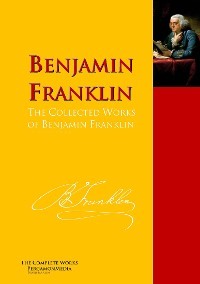
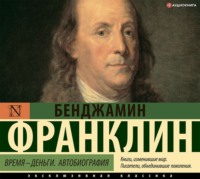

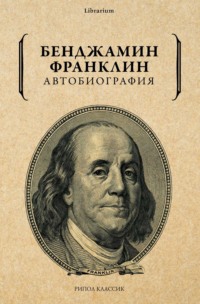
![Memoirs of Benjamin Franklin; Written by Himself. [Vol. 2 of 2]](/covers_200/24858395.jpg)
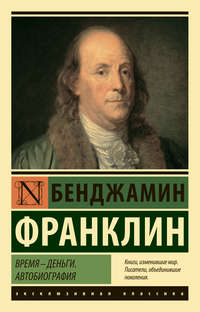
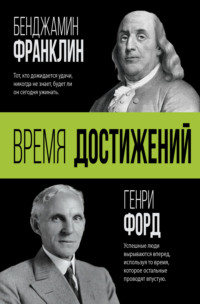
![Memoirs of Benjamin Franklin; Written by Himself. [Vol. 1 of 2]](/covers_200/24858139.jpg)